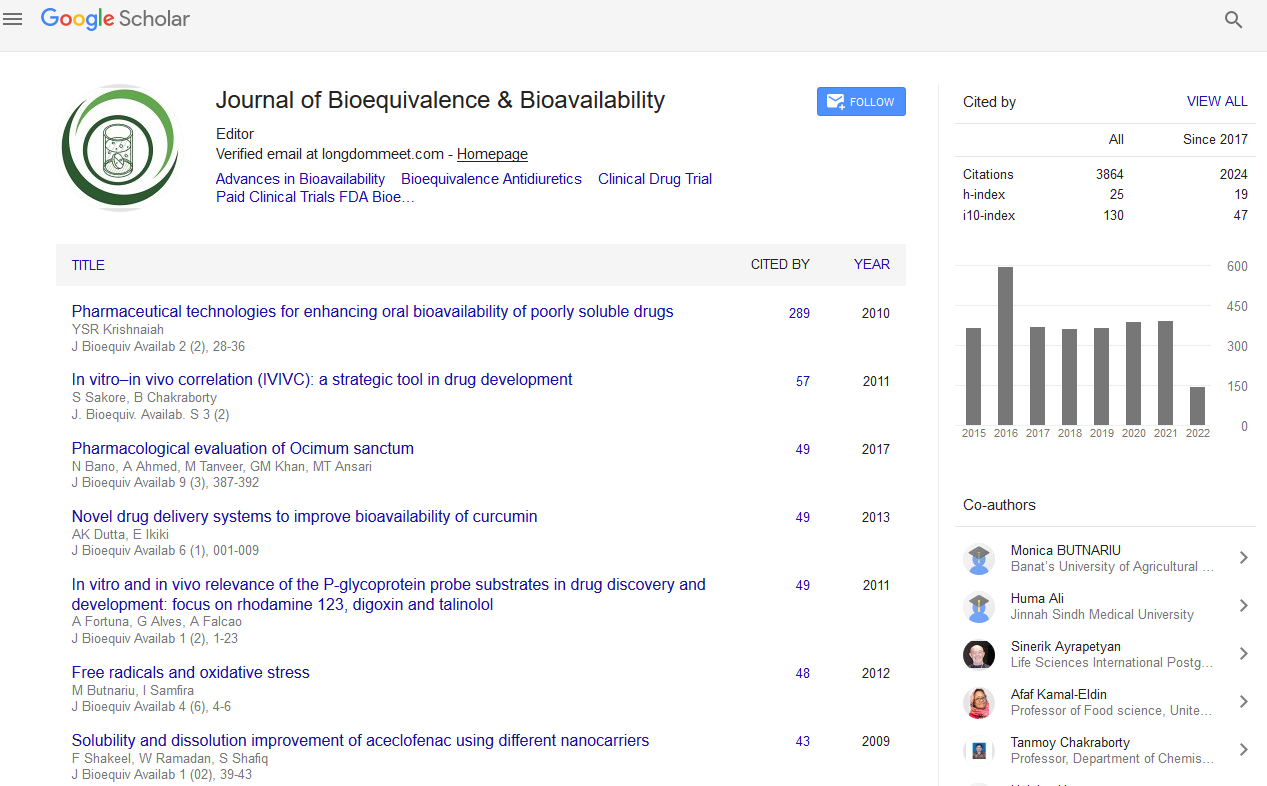PMC/PubMed Indexed Articles
Indexed In
- Academic Journals Database
- Open J Gate
- Genamics JournalSeek
- Academic Keys
- JournalTOCs
- China National Knowledge Infrastructure (CNKI)
- CiteFactor
- Scimago
- Ulrich's Periodicals Directory
- Electronic Journals Library
- RefSeek
- Hamdard University
- EBSCO A-Z
- OCLC- WorldCat
- SWB online catalog
- Virtual Library of Biology (vifabio)
- Publons
- MIAR
- University Grants Commission
- Geneva Foundation for Medical Education and Research
- Euro Pub
- Google Scholar
Useful Links
Share This Page
Journal Flyer

Open Access Journals
- Agri and Aquaculture
- Biochemistry
- Bioinformatics & Systems Biology
- Business & Management
- Chemistry
- Clinical Sciences
- Engineering
- Food & Nutrition
- General Science
- Genetics & Molecular Biology
- Immunology & Microbiology
- Medical Sciences
- Neuroscience & Psychology
- Nursing & Health Care
- Pharmaceutical Sciences
Structural approaches for targeted therapy
7th World Congress on Bioavailability & Bioequivalence: BA/BE Studies Summit
August 29-31, 2016 Atlanta, USA
Somdutta Saha
GlaxoSmithKline, USA
Scientific Tracks Abstracts: J Bioequiv Availab
Abstract:
Tumor associated carbohydrate antigens (TACAs) are a class of glycans with important structural and signaling functions playing a major role in cell proliferation, differentiation, and apoptosis relevant to oncology. Tumor cells expressing TACAs influence prognosis and survival of cancer patients. We have used structure-based approaches to study antigen-antibody interactions in the tumor micro-environment and designed a peptidyl ligand that mimics the molecular topology of TACAs even though they are chemically dissimilar but functionally equivalent molecular structures. The work on antibody-TACA interactions suggests that in designing antibodies, careful consideration should be made in using mutations that enhance the rigidity of an antibody. Our work also suggests that electrostatics play a major role in the recognition of the model antigen examined. Discrimination against wanted targets through repulsive electrostatic interactions might be more fruitful than a strong optimization of target binding. Increased specificity toward one target leads to decreased affinity toward others. Models for TACA targeting reagents are typified by TACA reactive monoclonal antibodies, lectins, and perhaps oncolytic viruses that target sialylated receptors. Peptides reactive with TACA may, in particular, be interesting carbohydrate binding agents, forming the basis of novel drugs that combine the advantages of antibodies and small molecules. We have developed a peptidyl ligand that binds to the TF or T antigen (Galβ1- 3GalNAc). The designed peptidyl ligand was observed functionally to mediate cell signaling of TF expressing cell lines, suggesting that TF antigens might be functionally interesting.
Biography :
Somdutta Saha is presently working as a Post-doctoral Scientist at GlaxoSmithKline, Pennsylvania site where the broad focus is to computationally search for immunomodulators of microbial origin to chemo-genomic fine tuning the microbial imbalance in several autoimmune disorders and inflammatory bowel disease (IBD). She has received her PhD degree in Bioinformatics from the University of Arkansas for Medical Sciences where she has investigated the fundamental aspects of antigen-antibody interaction in the tumor microenvironment using several computational approaches under the mentorship of Dr. Thomas Kieber- Emmons.
Email: sombioinfo@gmail.com


